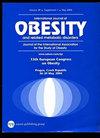Whose tweets about obesity and weight loss gain the most attention: celebrities, political, or medical authorities?
IF 3.8
2区 医学
Q1 ENDOCRINOLOGY & METABOLISM
引用次数: 0
Abstract
X (formerly Twitter) is a unique social medium where many famous people and health institutions post and interact with casual users. We aimed to explore reactions to tweets about obesity and weight loss from accounts representing celebrities, politicians, sportsmen, and health authorities. We collected tweets from n = 2444 X profiles representing seven categories: celebrities, politicians, sportsmen, medical specialists, medical journals, medical universities, and health institutions. We retrieved tweets from the accounts and selected tweets about, e.g., obesity, overweight, body mass index, and weight loss. We conducted sentiment analysis, descriptive statistics, and multivariable quantile regression modeling. In quantile regression models, each tau represents a decile from 0.1 to 0.9 of the dependent variable (number of likes or retweets). Therefore, a tau value of 0.5 represents the 5th decile, the 50th percentile, and the median of the dependent variable. The final dataset consisted of n = 8989 tweets. Achieving a large number of likes (taus 0.7, 0.8, and 0.9) was positively associated with posts written by celebrities, politicians, medical journals, and universities, while it was negatively associated with tweets authored by health institutions or medical specialists. In the case of a significant number of retweets, a positive association was observed for all account types, except for health institutions, for which the relationship was negative. These relationships were independent of verification status, the number of followers, tweet length, and sentiment. Tweets concerning obesity and weight loss originating from accounts representing health institutions garnered fewer likes and retweets compared to other types of accounts, including non-medical ones. A limitation of the study is the relatively small number of tweets emanating from non-medical accounts. A X informational campaign about obesity should engage non-medical accounts with many followers to reach as many users as possible.

关于肥胖和减肥的推文最受关注的是谁:名人、政治家还是医学权威?
背景介绍X(原 Twitter)是一个独特的社交媒体,许多名人和医疗机构都在这里发布信息并与普通用户互动。我们的目的是探索名人、政治家、运动员和卫生机构的代表账户对有关肥胖和减肥的推文的反应:我们从代表名人、政治家、运动员、医学专家、医学期刊、医科大学和卫生机构等七个类别的 n = 2444 X 个人资料中收集了推文。我们从这些账户中检索了推文,并选择了有关肥胖、超重、体重指数和减肥等方面的推文。我们进行了情感分析、描述性统计和多变量量化回归建模。在量子回归模型中,每个 tau 代表因变量(点赞数或转发数)从 0.1 到 0.9 的十分位数。因此,0.5 的 tau 值代表因变量的第 5 个十分位数、第 50 个百分位数和中位数:最终数据集包含 n = 8989 条推文。获得大量点赞(ta 值分别为 0.7、0.8 和 0.9)与名人、政治家、医学期刊和大学撰写的文章呈正相关,而与医疗机构或医学专家撰写的推文呈负相关。在大量转发的情况下,所有类型的账户都呈正相关,只有医疗机构例外,两者呈负相关。这些关系与验证状态、粉丝数量、推文长度和情感无关:结论:与其他类型的账户(包括非医疗账户)相比,来自医疗机构账户的有关肥胖和减肥的推文获得的点赞和转发较少。这项研究的局限性在于非医疗账户的推文数量相对较少。有关肥胖症的 X 宣传活动应该让拥有众多追随者的非医疗账户参与进来,以接触到尽可能多的用户。
本文章由计算机程序翻译,如有差异,请以英文原文为准。
求助全文
约1分钟内获得全文
求助全文
来源期刊

International Journal of Obesity
医学-内分泌学与代谢
CiteScore
10.00
自引率
2.00%
发文量
221
审稿时长
3 months
期刊介绍:
The International Journal of Obesity is a multi-disciplinary forum for research describing basic, clinical and applied studies in biochemistry, physiology, genetics and nutrition, molecular, metabolic, psychological and epidemiological aspects of obesity and related disorders.
We publish a range of content types including original research articles, technical reports, reviews, correspondence and brief communications that elaborate on significant advances in the field and cover topical issues.
 求助内容:
求助内容: 应助结果提醒方式:
应助结果提醒方式:


